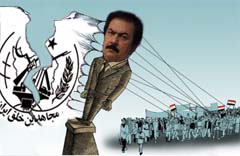The residents of Diyala province in Iraq condemned the crimes committed by the anti-Iran  terrorist Mojahedin-e Khalq Organization (MKO, also known as the MEK and PMOI) against the Iranian and Iraqi nations, and underlined the necessity for the rapid expulsion of the terrorist group from Iraq.
terrorist Mojahedin-e Khalq Organization (MKO, also known as the MEK and PMOI) against the Iranian and Iraqi nations, and underlined the necessity for the rapid expulsion of the terrorist group from Iraq.
Several people from Diyala province have sent an email to Habilian declaring their displeasure over the MKO terrorist group’s presence on their territory.
According to a report published by the Habilian Association, a human rights group formed of the families of 17,000 Iranian terror victims, the email contains images of large signboards installed along the roads of Diyala province opposing the presence of Mujahedin-e Khalq terrorist group inside their country.
The message reads, "On behalf of the residents of Diyala, we confirm Iraqi government’s decision to expel Monafeqin-e Khalq (as they are called in Iraq). We urge the government to clean our holy land from their presence.
A group of professors, scholars and tribal sheikhs and the residents of Baqubah, Iraq."
The MKO, whose main stronghold is in Iraq, is blacklisted by much of the international community, including the United States.
Before an overture by the EU, the MKO was on the European Union’s list of terrorist organizations subject to an EU-wide assets freeze. Yet Maryam Rajavi, who has residency in France, regularly visited Brussels and despite the ban enjoyed full freedom in Europe.
The MKO is behind a slew of assassinations and bombings inside Iran, a number of EU parliamentarians said in a recent letter in which they slammed a British court decision to remove the MKO from the British terror list. The EU officials also added that the group has no public support within Iran because of their role in helping Saddam Hussein in the Iraqi imposed war on Iran (1980-1988).
Many of the MKO members abandoned the terrorist organization while most of those still remaining in the camp are said to be willing to quit but are under pressure and torture not to do so.
A May 2005 Human Rights Watch report accused the MKO of running prison camps in Iraq and committing human rights violations.
According to the Human Rights Watch report, the outlawed group puts defectors under torture and jail terms.
The group started assassination of the citizens and officials after the revolution in a bid to take control of the newly established Islamic Republic. It killed several of Iran’s new leaders in the early years after the revolution, including the then President, Mohammad Ali Rajayee, Prime Minister, Mohammad Javad Bahonar and the Judiciary Chief, Mohammad Hossein Beheshti who were killed in bomb attacks by MKO members in 1981.
The group fled to Iraq in 1986, where it was protected by Saddam Hussein and where it helped the Iraqi dictator suppress Shiite and Kurd uprisings in the country.
The terrorist group joined Saddam’s army during the Iraqi imposed war on Iran (1980-1988) and helped Saddam and killed thousands of Iranian civilians and soldiers during the US-backed Iraqi imposed war on Iran.
Since the 2003 US invasion of Iraq, the group, which now adheres to a pro-free-market philosophy, has been strongly backed by neo-conservatives in the United States, who also argue for the MKO to be taken off the US terror list.
The MKO has been in Iraq’s Diyala province since the 1980s.
Iraqi security forces took control of the training base of the MKO at Camp Ashraf – about 60km (37 miles) North of Baghdad – in 2009 and detained dozens of the members of the terrorist group.
The Iraqi authority also changed the name of the military center from Camp Ashraf to the Camp of New Iraq.

